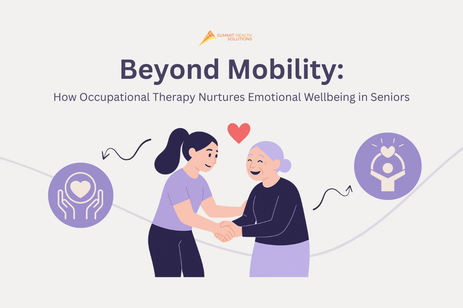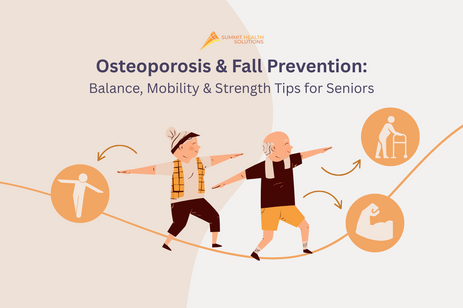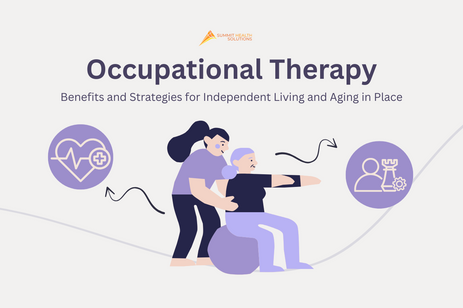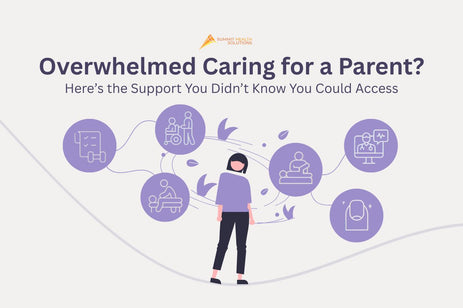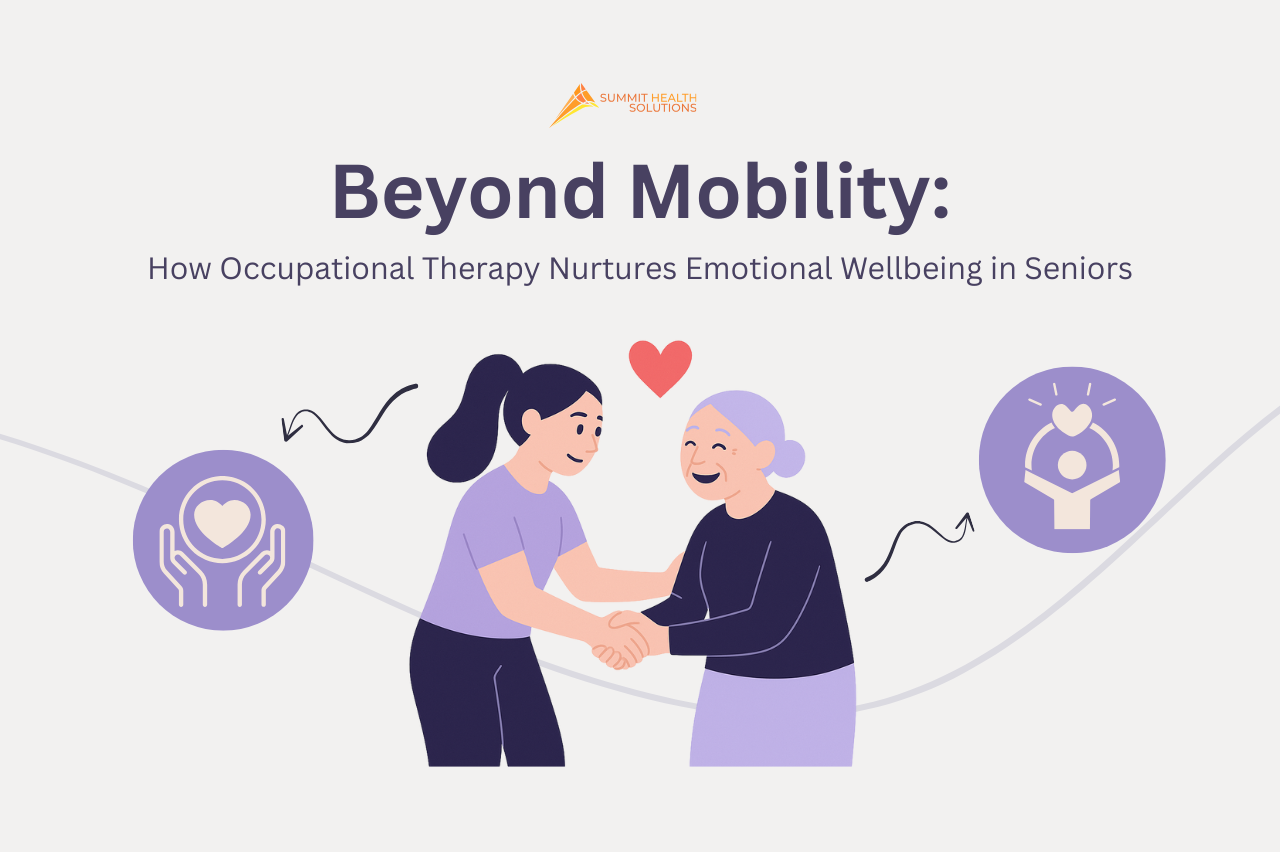
For many older adults, maintaining independence goes far beyond physical strength — it’s about feeling capable, connected, and confident in everyday life. That’s where occupational therapy makes a powerful difference.
While often associated with physical rehabilitation, occupational therapy offers much more — supporting seniors in their emotional wellbeing, independent living, and overall quality of life. At Summit Health Solutions, our dedicated clinicians specialise in helping seniors not just move better, but live better through our tailored Occupational Therapy services.
The Heart of Occupational Therapy: Living Life with Purpose
Occupational therapy (OT) focuses on enabling individuals to engage in the meaningful activities that make life fulfilling — known as activities of daily living. For seniors, this might mean cooking, gardening, socialising, or even enjoying a quiet hobby with ease.

According to the Australian Government Department of Health and Aged Care, occupational therapists help older adults maintain or regain independence by modifying environments, teaching adaptive techniques, and providing practical tools that make daily life safer and more enjoyable.
This holistic approach isn’t just about movement — it’s about empowering emotional confidence and self-esteem, allowing seniors to stay active, connected, and independent for longer.
How Occupational Therapy Promotes Emotional Wellbeing
1. Rebuilding Confidence Through Independence
Losing the ability to perform daily tasks can deeply affect a senior’s emotional state. Feelings of frustration, dependency, or isolation often follow. Occupational therapy focuses on restoring independence by teaching practical strategies to complete activities of daily living safely — such as dressing, grooming, and meal preparation.
These small victories build confidence, helping seniors feel capable again. Research from the University of Sydney’s Faculty of Medicine and Health highlights that even modest improvements in function can dramatically boost a person’s sense of control and wellbeing.
2. Creating a Sense of Purpose and Routine
Emotional wellbeing thrives on purpose. Occupational therapists help seniors rediscover what’s meaningful to them — whether that’s crafting, walking a pet, or volunteering. Structured routines encourage active aging, providing a sense of accomplishment and reducing anxiety or depression.
By focusing on meaningful engagement, therapy nurtures not just physical strength but emotional resilience.
3. Reducing Loneliness and Social Isolation
Social interaction is essential for emotional health, but many seniors experience isolation due to mobility challenges or fear of falling. Occupational therapists work to remove these barriers through environmental adaptations and mobility aids, allowing seniors to engage safely with others.
A 2023 study from the World Health Organization (WHO) shows that social connection plays a major role in preventing cognitive decline and depression among older adults. OT helps facilitate these social opportunities — empowering seniors to reconnect with friends, family, and community.
4. Supporting Emotional Regulation During Transitions
Major life changes, such as retirement, illness, or loss of a partner, can significantly impact mental health. Occupational therapists provide coping strategies to navigate these transitions. Through mindfulness-based activities, journaling, and guided engagement, OT supports emotional adaptability — helping seniors process change with confidence rather than fear.
This emotional support complements the physical rehabilitation aspect, embodying OT’s holistic approach to geriatric care.
The Link Between Emotional Wellbeing and Independence
Emotional health directly influences physical recovery and independence. When seniors feel positive and empowered, they’re more likely to participate in therapy and engage in activities of daily living.
Occupational therapists often collaborate with physiotherapists, psychologists, and care coordinators to ensure a whole-person approach — improving outcomes across both emotional and physical health.
This balance of mind and body is central to Summit Health Solutions’ Occupational Therapy program, where each session is designed to enhance quality of life, not just movement.
Encouraging Active Aging and Quality of Life
The philosophy of active aging, supported by the Australian Institute of Health and Welfare (AIHW), emphasises that seniors thrive when they stay mentally, socially, and physically engaged.
Occupational therapy aligns perfectly with this goal — it encourages seniors to remain active participants in their own care. Whether it’s learning how to use assistive devices, managing fatigue, or adapting hobbies, OT promotes sustained independence and dignity.
For a deeper look into how movement and daily engagement can enhance longevity, you can explore our related post: “Occupational Therapy Benefits and Strategies for Independent Living and Aging in Place” (insert internal link here once live)
What to Expect from Summit Health Solutions’ Occupational Therapy
Our Occupational Therapy for seniors is tailored to promote independence, emotional wellbeing, and daily function. Delivered through compassionate, evidence-based care, our program offers:
-
🏡 Home-based assessments to improve safety and comfort in living environments
-
💪 Customised therapy plans focused on building strength, coordination, and confidence
-
🧠 Cognitive and emotional support to manage anxiety, memory, or mood challenges
-
🤝 Guidance for caregivers and families to ensure ongoing support
-
🌟 Tools and adaptive techniques for safe performance of daily tasks and meaningful activities
Through consistent engagement, seniors regain confidence in their abilities — making everyday tasks feel rewarding, not daunting.
👉 Learn more about our Occupational Therapy services for seniors and how they can support both physical and emotional wellbeing.
FAQs About Occupational Therapy for Seniors
1. What is the main goal of occupational therapy for seniors?
The main goal is to help seniors maintain independence and perform activities of daily living safely. This includes physical tasks, emotional coping, and social participation — all contributing to an improved quality of life.
2. How does occupational therapy improve emotional wellbeing?
OT helps seniors rebuild confidence, stay socially connected, and engage in purposeful routines. These elements reduce anxiety, depression, and loneliness while enhancing self-esteem and motivation.
3. Is occupational therapy only for people with physical conditions?
Not at all. While OT supports physical recovery, it also addresses cognitive and emotional needs. It benefits anyone aiming for greater independent living and emotional balance, especially during transitions like aging or post-rehabilitation.
4. How often should seniors attend occupational therapy sessions?
Frequency depends on individual needs. Most programs start with weekly sessions, tapering as seniors gain confidence and mastery in their daily routines. Your therapist at Summit Health Solutions will recommend a schedule that suits your pace and goals.
5. Can occupational therapy help with memory or mild cognitive decline?
Yes. Occupational therapy can support brain health through structured activities, memory aids, and adaptive strategies that improve daily functioning — fostering emotional wellbeing and a sense of accomplishment.
Occupational therapy is not just about restoring movement — it’s about nurturing the mind, body, and spirit. For seniors, it opens the door to a richer, more connected life filled with independence, emotional strength, and purpose.
At Summit Health Solutions, our compassionate occupational therapists are dedicated to helping older adults thrive through meaningful engagement and holistic care.
💙 Empower your loved ones to live fully — physically, mentally, and emotionally.
👉 Learn more or book a consultation today: Summit Health Solutions Occupational Therapy

